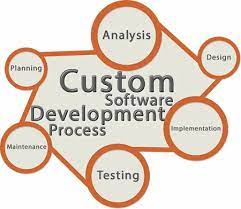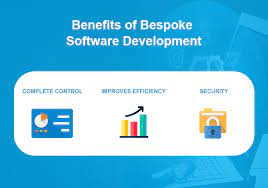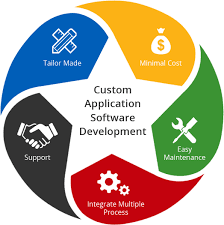Unlocking Business Potential: The Power of Custom Enterprise Software Development
The Importance of Custom Enterprise Software Development
In today’s fast-paced business environment, having the right tools and technologies in place is crucial for success. Custom enterprise software development plays a key role in helping organizations streamline their operations, improve efficiency, and stay competitive in the market.
Benefits of Custom Enterprise Software:
Tailored Solutions: Off-the-shelf software may not always meet the unique requirements of a business. Custom enterprise software is designed to address specific needs and processes, ensuring optimal performance and functionality.
Scalability: As businesses grow and evolve, their software needs to scale accordingly. Custom solutions can be easily adapted and expanded to accommodate changing business requirements.
Integration Capabilities: Custom software can be seamlessly integrated with existing systems and applications, allowing for a unified workflow and data exchange across the organization.
Key Considerations for Custom Software Development:
Requirements Analysis: Understanding the business objectives and user needs is essential for developing effective custom software solutions.
Agile Development Approach: Adopting an agile methodology allows for iterative development, frequent feedback, and continuous improvement throughout the project lifecycle.
Security and Compliance: Data security and regulatory compliance should be prioritized during the development process to protect sensitive information and ensure legal adherence.
Conclusion:
Custom enterprise software development offers organizations a competitive edge by providing tailored solutions that align with their unique business requirements. By investing in custom software development, businesses can enhance productivity, streamline processes, and drive innovation in today’s digital landscape.
7 Advantages of Custom Enterprise Software Development: Tailored Solutions, Scalability, and More
- Tailored solutions to meet specific business needs.
- Scalability for easy adaptation to business growth.
- Enhanced integration capabilities with existing systems.
- Increased efficiency and productivity through optimized workflows.
- Improved data security and regulatory compliance measures.
- Custom features and functionalities that align with business processes.
- Greater flexibility in software customization and updates.
7 Drawbacks of Custom Enterprise Software Development: Costs, Delays, and Complexity
- High initial cost of development
- Longer development time compared to off-the-shelf solutions
- Potential for scope creep leading to project delays
- Dependency on skilled developers for maintenance and updates
- Risk of compatibility issues with future software upgrades
- Limited vendor support compared to commercial software providers
- Possibility of over-engineering the solution, resulting in unnecessary complexity
Tailored solutions to meet specific business needs.
Custom enterprise software development offers the advantage of providing tailored solutions to meet specific business needs. Off-the-shelf software may not always align perfectly with the unique requirements of a company, leading to inefficiencies and limitations. By opting for custom software development, organizations can work closely with developers to create solutions that address their specific processes, workflows, and challenges. This tailored approach ensures that the software is optimized for the company’s operations, resulting in improved efficiency, productivity, and overall performance.
Scalability for easy adaptation to business growth.
Scalability is a significant advantage of custom enterprise software development as it allows businesses to easily adapt and expand their software solutions in alignment with their growth and evolving needs. Custom software can be tailored to accommodate increased data volumes, user numbers, and changing business processes without compromising performance or efficiency. This flexibility ensures that organizations can seamlessly scale their operations while maintaining optimal functionality, ultimately supporting sustained growth and success in a competitive market landscape.
Enhanced integration capabilities with existing systems.
Custom enterprise software development offers the significant advantage of enhanced integration capabilities with existing systems. By creating custom solutions tailored to specific business needs, organizations can ensure seamless connectivity and data exchange between different software applications and platforms. This streamlined integration not only improves operational efficiency but also enables a more cohesive workflow across the entire organization, leading to better collaboration, data consistency, and overall productivity.
Increased efficiency and productivity through optimized workflows.
Custom enterprise software development offers the significant advantage of increased efficiency and productivity through optimized workflows. By tailoring software solutions to align with specific business processes and requirements, organizations can streamline operations, eliminate manual tasks, and automate repetitive functions. This optimization of workflows not only saves time but also reduces errors, enhances collaboration among teams, and ultimately boosts overall productivity within the organization.
Improved data security and regulatory compliance measures.
Custom enterprise software development offers improved data security and regulatory compliance measures, ensuring that businesses can protect sensitive information and adhere to legal requirements effectively. By customizing software solutions to incorporate robust security features and compliance protocols, organizations can mitigate risks associated with data breaches and non-compliance issues. This proactive approach not only safeguards valuable data but also builds trust with customers and stakeholders, demonstrating a commitment to upholding privacy standards and industry regulations.
Custom features and functionalities that align with business processes.
Custom enterprise software development offers the advantage of creating tailored features and functionalities that align perfectly with a business’s unique processes. By customizing the software to match specific workflows and requirements, organizations can optimize efficiency, improve productivity, and enhance overall performance. This tailored approach ensures that the software not only meets but exceeds the needs of the business, leading to better outcomes and a competitive edge in the market.
Greater flexibility in software customization and updates.
Greater flexibility in software customization and updates is a significant advantage of custom enterprise software development. With custom solutions, businesses have the freedom to tailor the software to meet their specific needs and make adjustments as their requirements evolve over time. This flexibility allows for seamless integration with existing systems and processes, ensuring that the software remains relevant and efficient. Additionally, custom software enables businesses to stay up-to-date with the latest technologies and industry trends through regular updates and enhancements, providing a competitive edge in the market.
High initial cost of development
The high initial cost of development is a significant drawback of custom enterprise software development. Creating tailored solutions from scratch requires substantial investment in terms of time, resources, and expertise. Businesses may face budget constraints and financial challenges when allocating funds for custom software projects, especially compared to off-the-shelf solutions that have lower upfront costs. The high initial cost can be a barrier for some organizations looking to leverage custom software to meet their specific needs and objectives.
Longer development time compared to off-the-shelf solutions
One significant drawback of custom enterprise software development is the extended development time required in comparison to off-the-shelf solutions. Building a custom software solution tailored to specific business needs involves thorough planning, design, development, and testing phases, which can significantly lengthen the overall project timeline. This prolonged development process may delay the implementation of critical software functionalities and hinder the organization’s ability to quickly adapt to changing market demands or internal requirements.
Potential for scope creep leading to project delays
One significant drawback of custom enterprise software development is the potential for scope creep, which can result in project delays. Scope creep occurs when additional features or requirements are continuously added to the project beyond the initial scope, leading to an expansion of the project’s objectives and timeline. This can cause delays in project completion as resources and efforts are diverted to accommodate new changes, impacting the overall schedule and budget of the development process. Effective project management and clear communication are essential to mitigate scope creep and ensure that custom software projects stay on track and meet their intended deadlines.
Dependency on skilled developers for maintenance and updates
One significant drawback of custom enterprise software development is the dependency on skilled developers for maintenance and updates. Unlike off-the-shelf solutions that often come with vendor support and regular updates, custom software requires ongoing attention from experienced developers to address issues, implement new features, and ensure compatibility with evolving technologies. This reliance on specialized talent can lead to increased costs and potential delays in responding to urgent maintenance needs, making it challenging for organizations to maintain their custom software solutions efficiently.
Risk of compatibility issues with future software upgrades
One significant drawback of custom enterprise software development is the risk of compatibility issues with future software upgrades. As technology evolves rapidly, existing custom solutions may face challenges when integrating with new software versions or updates. This can lead to disruptions in operations, increased maintenance costs, and potential downtime as organizations struggle to adapt their custom software to meet the requirements of the latest technologies. Careful planning and ongoing maintenance are essential to mitigate these compatibility risks and ensure the long-term viability of custom enterprise software solutions.
Limited vendor support compared to commercial software providers
One significant drawback of custom enterprise software development is the limited vendor support compared to commercial software providers. When organizations opt for custom solutions, they often rely on in-house teams or third-party developers for maintenance, updates, and troubleshooting. This can lead to challenges in terms of timely support, expertise availability, and ongoing technical assistance. Unlike commercial software vendors who offer dedicated customer support services and regular updates, organizations investing in custom software may face uncertainties in addressing issues promptly and efficiently.
Possibility of over-engineering the solution, resulting in unnecessary complexity
One significant drawback of custom enterprise software development is the potential for over-engineering the solution, leading to unnecessary complexity. In an effort to address all possible scenarios and requirements, developers may end up adding features and functionalities that are not essential or may never be utilized. This can result in bloated software, increased maintenance costs, and difficulties in user adoption. Over-engineering a solution can hinder system performance, slow down processes, and make it harder to maintain and upgrade the software in the long run. It is crucial for organizations to strike a balance between meeting their specific needs and avoiding unnecessary complexity when opting for custom software development.











